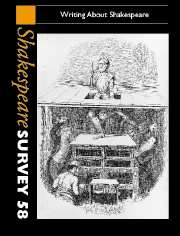Book contents
- Frontmatter
- Having Our Will: Imagination in Recent Shakespeare Biographies
- Toward a New Biography of Shakespeare
- Jonson, Shakespeare and the Exorcists
- ‘Lending soft audience to my sweet design’: Shifting Roles and Shifting Readings of Shakespeare’s ‘A Lover’s Complaint’
- ‘Armed at point exactly’: The Ghost in Hamlet
- Writing About Motive: Isabella, the Duke and Moral Authority
- Writing Performance: How to Elegize Elizabethan Actors
- Elizabeth Montagu: ‘Shakespear’s poor little Critick’?
- Rewriting Lear’s Untender Daughter: Fanny Price as a Regency Cordelia in Jane Austen’s Mansfield Park
- The Prequel as Palinode: Mary Cowden Clarke’s Girlhood of Shakespeare’s Heroines
- Shakespeare Among the Workers
- Virginia Woolf Reads Shakespeare: Or, her Silence on Master William
- Shakespeare and the Invention of the Epic Theatre: Working with Brecht
- Dramatizing the Dramatist
- Shakespeare in Drama Since 1990: Vanishing Act
- Writing about [Shakespearian] performance
- Shakespeare and the Prospect of Presentism
- Writing Shakespeare in the Global Economy
- The ‘Complexion’ of Twelfth Night
- Translation as Appropriation: Vassilis Rotas, Shakespeare and Modern Greek
- How Old Were Shakespeare’s Boy Actors?
- Mistress Tale Porter and the Triumph of Time: Slander and Old Wives’ Tales in The Winter’s Tale
- Shakespeare Performances in Ireland, 2002–2004
- Shakespeare Performances in England, 2004
- Professional Shakespeare Productions in the British Isles January–December 2003
- The Year's Contributions to Shakespearian Study 1 Critical Studies
- 2 Shakespeare in Performance
- 3 Editions and Textual Studies
- Books Received
- Index
Elizabeth Montagu: ‘Shakespear’s poor little Critick’?
Published online by Cambridge University Press: 28 March 2007
- Frontmatter
- Having Our Will: Imagination in Recent Shakespeare Biographies
- Toward a New Biography of Shakespeare
- Jonson, Shakespeare and the Exorcists
- ‘Lending soft audience to my sweet design’: Shifting Roles and Shifting Readings of Shakespeare’s ‘A Lover’s Complaint’
- ‘Armed at point exactly’: The Ghost in Hamlet
- Writing About Motive: Isabella, the Duke and Moral Authority
- Writing Performance: How to Elegize Elizabethan Actors
- Elizabeth Montagu: ‘Shakespear’s poor little Critick’?
- Rewriting Lear’s Untender Daughter: Fanny Price as a Regency Cordelia in Jane Austen’s Mansfield Park
- The Prequel as Palinode: Mary Cowden Clarke’s Girlhood of Shakespeare’s Heroines
- Shakespeare Among the Workers
- Virginia Woolf Reads Shakespeare: Or, her Silence on Master William
- Shakespeare and the Invention of the Epic Theatre: Working with Brecht
- Dramatizing the Dramatist
- Shakespeare in Drama Since 1990: Vanishing Act
- Writing about [Shakespearian] performance
- Shakespeare and the Prospect of Presentism
- Writing Shakespeare in the Global Economy
- The ‘Complexion’ of Twelfth Night
- Translation as Appropriation: Vassilis Rotas, Shakespeare and Modern Greek
- How Old Were Shakespeare’s Boy Actors?
- Mistress Tale Porter and the Triumph of Time: Slander and Old Wives’ Tales in The Winter’s Tale
- Shakespeare Performances in Ireland, 2002–2004
- Shakespeare Performances in England, 2004
- Professional Shakespeare Productions in the British Isles January–December 2003
- The Year's Contributions to Shakespearian Study 1 Critical Studies
- 2 Shakespeare in Performance
- 3 Editions and Textual Studies
- Books Received
- Index
Summary
The publication of Elizabeth Montagu’s Essay on the Writings and Genius of Shakespear in 1769 coincided with the zenith of eighteenth-century bardolatry. It is generally acknowledged that this was the era in which Shakespeare’s central place in British literary culture was established. The eighteenth century saw a huge expansion of scholarly interest in the dramatist, opening up a significant new site for literary debate. In addition to the various critical editions of Shakespeare’s works by men of letters such as Rowe, Pope, Theobald, Hanmer and Warburton, numerous essays, commentaries and critical monographs sought to explain and elucidate Shakespeare for the current age. Even works on wider subjects such as poetic theory (Charles Gildon’s 1718 The Complete Art of Poetry) or theories of genius (William Duff’s 1767 An Essay on Original Genius) increasingly turned to Shakespeare to illustrate their precepts. This new scholarship had the effect of establishing Shakespeare’s literary value as on a par with that of the classical authors; indeed, he became known as the English Homer. Shakespeare’s position as Britain’s national poet and cultural hero was also confirmed in other ways, such as by the erection of a statue in Poets’ Corner, Westminster Abbey in 1741. The culmination of this cultural canonisation came, as Michael Dobson has convincingly argued, with David Garrick’s Stratford Jubilee of 1769.
The establishment of Shakespeare’s place in the literary canon offered an important opening to women. By the eighteenth century, women were increasingly involved and acknowledged in literature but they were still mainly confined to acceptable feminine genres and to imaginative rather than critical writing. Women had previously been excluded from criticism and scholarship, largely because until this time works in the ancient languages had received the greatest degree of critical attention and women for the most part lacked a classical education.
- Type
- Chapter
- Information
- Shakespeare Survey , pp. 72 - 82Publisher: Cambridge University PressPrint publication year: 2005
- 2
- Cited by



